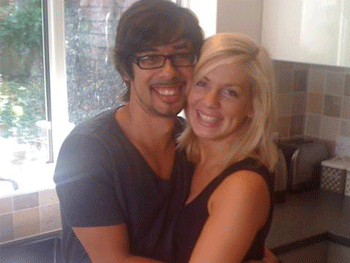A New Hope
April 2012
It meets in a house. On a Saturday. Its minister can hold his own on a pool table. The church’s Easter Sunday service began with a cooked breakfast.
This Hope in Newton Abbot may not look like a traditional Baptist church. But though in its infancy, this new Devon church plant has experienced an exciting few months, and is reaching both those on the fringes of church life and others without any kind of church background.
It’s a story that takes in the closure of a small Baptist church and the inventive re-allocation of its assets; links with BMS World Mission and a dose of inspiration from Indian church planters; a brave Association and an even braver young couple. It draws inspiration from a pioneering Baptist heritage. Most importantly Jesus is at its centre as those involved seek to model a way of living based on his teaching.
This Hope Baptist Church grew out of Newton Abbot Church, which closed in early 2009.

‘Newton Abbot Baptist Church had moved from its old Victorian building to a school hall in the hope of rekindling something,’ explains the Revd J
ez Brown, regional minister and team leader South West Baptist Association.
‘But it wasn’t working and I suggested it close, even though there were about 20 members. It was quite a risk.’
The Association, alongside the Baptist Union, sold the building, refurbished the manse and ring fenced the money for a new, pioneering worship community. There were already 14 churches in Newton Abbot ‘so it had to be something different,’ says Jez.
‘We wanted a church from scratch, and our Association trustees were brilliant. The approach was let’s just see what happens.’
Around this time Joe Haward from Mersea Island in Essex, an eighth generation oyster fisherman, had completed his degree from Spurgeon’s College and been ordained.
As part of his ministerial training he had visited India with BMS World Mission in 2009.
He saw lots of indigenous planting - evangelists taking the gospel directly to isolated communities in flexible and appropriate ways. The resulting churches would meet where they could, whether that be under a tree or in a home. One day he saw 11 people baptised in a pool where people in the village would bathe or do their washing. ‘The gospel was being displayed quite openly. It wasn’t being hidden away,’ said Joe.
‘It planted a seed in me about church planting in the UK. Obviously it wouldn’t be exactly the same. But could it look similar?’ He was contacted by a friend about the position in Newton Abbot, which had recently been advertised by the SWBA. Joe was interested and wrote a paper about incarnational church planting.
Joe and wife Sarah were duly invited for an interview in January 2010. There had been some interesting proposals, but the couple were clearly the most impressive applicants. ‘They just blew us away,’ says Jez.
‘Joe had clearly done his homework, and had already worked out who he would align with, despite living a long way away in Essex.’ Joe, Sarah and their daughter Grace moved in August 2010. Sarah was pregnant with their second child.
They didn’t actually know anybody in Newton Abbot, let alone know what the church would look like. ‘It was quite a risk,’ says Joe. ‘We were moving from a place where we knew everyone, to where we didn’t know anyone. It was a big thing for us. It made us realise we had to get to know people. We were on our own in a sense.’
The first few months were spent praying, listening to God, and building relationships in the town. Joe, 30, took to the streets, prayer walking, trying to meet people in pubs, cafes and other voluntary groups.
A number of opportunities opened up - work with a school, a disabled charity, on an estate. He met a few people who wanted to explore church. Links and relationships were being established.
After a year Joe and Sarah, 26, felt ready for - and the need for - regular Christian fellowship.
They asked God for Christians to join them - and a few days later met a Christian couple who were looking for church. A couple from the old Baptist church also joined. In October they met in their home for the first time.
‘We broke bread, committed to each other, and felt the first fledgling steps of a new church,’ says Joe.
They continued to meet, and from January this year they have begun to meet every week in Joe and Sarah’s home. It is always on a Saturday - it just seemed a better day culturally, says Joe. (Though it did meet on Easter Sunday, where proceedings began with a hearty breakfast).
But it is recognisably church. ‘We’re doing the ancient things church has always done. Meeting, breaking bread, praying, studying the scriptures. There is always communion - by focusing directly on Jesus it stops it from being a social gathering.
‘We’re trying to love God with all that we are and encourage one another through the way we live and meet.’
Things have developed quickly, and around 35 people are now meeting. The group is a mix: committed Christians looking for a church locally; those who have been on the fringe of church; and some completely unchurched, with no concept of church or faith. ‘By God’s grace we’ve got this growing group of people,’ says Joe.
‘There’s a really good age spread, people from different backgrounds. It’s really exciting to see people who haven’t known each other very long, building relationships.’
He said the key to the growth is the relationship aspect. ‘Everybody who is coming is as a result of a relationship, through people I’ve met out and about. People who’ve told other people about it. It’s all relational. People are coming along because they know and trust somebody. They are willing to go with it. I’ve learnt you have to invest in relationships.’
Jez adds, ‘For the first 14 months he just made himself known in the town. He just met people – across the shops, in cafes. He beat the landlord of a pub at pool, with the landlord not realising he was a Baptist minister!
‘Now 35 people are meeting in his home. These are people he’s met through friendship.’

The SWBA has agreed to fund Joe for three years. It will continue to support him after this time, with applications for a Home Mission grants.
‘We’re really praying about what to do next,’ says Joe. ‘It’s quite a squeeze in our home.
‘I’ve learnt that prayer is the first thing, and that we are called unashamedly to be church. It’s obviously very early days. But it is exciting.’
While he is reluctant to suggest this for other areas, Joe wonders whether other Associations might consider this incarnational way of church planting - and draw on a sense of Baptist history while doing so.
‘Just because God is doing this here doesn’t mean it will work elsewhere, and I don’t think one size fits all. But equally Associations need to be willing to consider this might be a way of planting a church.
‘It’s not easy. It’s quite pioneering, simply sending a couple to live in a community. Associations should consider what’s going on here. If you look at Baptist history, they were pioneering - and this is pioneering.
‘And as ministers, we simply have to get to know people who don‘t know Jesus. There are no short-cuts.’
Jez would agree. ‘I wouldn’t even say that we should bottle this, because so much depends on the personality. Joe’s a great entrepreneurial guy.
‘But it’s an example of what can happen if you are willing to take a risk.’